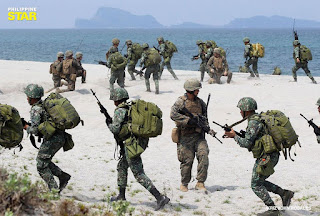PH-US BOND STRENGTHENED FURTHER WITH GALVEZ-AUSTIN MEET
Dateline Kamuning:
Defense Secretary Carlito G. Galvez, Jr. and United States Secretary of Defense Lloyd J. Austin III held a ‘productive’ and ‘meaningful’ meeting during the latter’s official visit at the Department of National Defense on Thursday.
“The visit of US Defense Secretary Lloyd Austin III here in the Philippines signifies a strong bond and enduring partnership between the Philippines and the United States, particularly in the areas of humanitarian assistance, economic development, and peace and security among others,” said Galvez.
Accelerating implementation of EDCA
The Defense Chiefs reiterated the commitment of the Philippines and the US to collaborate and accelerate the implementation of the Enhanced Defense Cooperation Agreement (EDCA). They announced the agreement to designate four (4) new Agreed Locations under EDCA in strategic areas of the country.
According to Austin, the meeting included discussions on how Philippine and US forces can operate together more efficiently from key sites across the Philippines under EDCA.
“We talked about how we are co-investing in EDCA sites to support security cooperation, combined training, humanitarian assistance and disaster relief, and how all those efforts make both of our countries more secure,” said the Pentagon Chief.
Galvez said that the specifics of the sites are still being finalized.
"We withhold the announcement of the EDCA sites because our protocols and also our diplomatic notes have not been completed. So we need to complete all the staff work, including our consultations with the LGUs (local government units)," said Galvez. “I cannot say for now where the new Agreed Locations are, as we want to respect our consultations with the concerned LGUs, as well as give due consideration to Interior Secretary Benhur Abalos.”
Galvez and Austin both emphasized that the Agreed Locations under EDCA are not permanent US bases, but rather facilities that will be jointly operated by US and Philippine forces.
“EDCA is not about permanent basing here in the Philippines. It is about providing access that allows us to increase our training opportunities with our partners, our allies here,” said Austin. “EDCA is a collaborative agreement that enables rotational activities so it’s a key pillar of training and opportunities to strengthen our interoperability.”
Commitment to alliance, partnership
“The visit of Secretary Austin is very meaningful to us,” the Philippine Defense Chief said. “It is symbolic to all of us that the US will remain to be a reliable partner to the Filipino people.”
Galvez likewise underpinned the future of the partnership of the two allies amid the various security challenges in the region. This includes stronger collaboration on high-impact and high-value activities under the Philippine-US cooperative mechanisms, as well as response to the COVID-19 pandemic and terrorism.
“These efforts, which we hope to jointly undertake are in line with the guidance of President Ferdinand Marcos Jr., and that is for the Defense department to make sure that not an inch of our nation’s territory will be lost and our people’s safety and security will be ensured,” he said.
The US Defense Chief hailed the activity as a productive meeting and underscored its importance in the continued implementation of the Mutual Defense Treaty between the two countries.
“Today, Secretary Galvez and I reaffirmed our Mutual Defense Treaty commitments, and … I am optimistic of the future of our alliance, and I am confident that we will continue to defend our shared value of freedom, democracy, and human dignity.”
Both Galvez and Austin expressed they are looking forward to continuously working to develop the two countries’ joint defense capabilities.
For his part, Galvez said that high-level engagements such as the bilateral meeting with the US Defense Secretary manifests the Philippine government’s thrust to have open channels of communication and constant dialogue with everyone.
“Our successful meeting with Secretary Austin reinforces our drive to collaborate more effectively with both our traditional and non-traditional partners, especially on matters of national and regional security,” said Galvez. “I am sure that there will be more similar engagements in our horizon at the DND.”



Comments